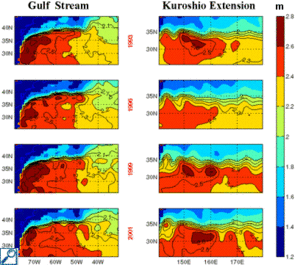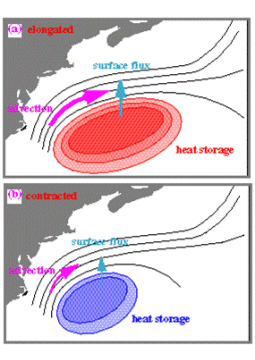Current heat
Image of the month - January 2005
Changes in the extend of the Gulf Stream and the Kuroshio. "Elongated" current extend (see right scheme) in 1993 and 1999, contracted in 1996 and 2001, as seen by Topex/Poseidon (left). (Credits University of Washington)
Much of the heat transported poleward by the oceans is carried in the "western boundary currents", like the Gulf Stream (in the North Atlantic) or the Kuroshio (in the North Pacific). As they extend into the open ocean, some of their heat goes into the atmosphere, and some is stored. Sea surface height measured by altimetry satellites depends -- among other things -- on the water temperature (both surface heating and changes in layer thickness give changes in heat content), and thus can vary with heat storage and transport. The upper ocean heat budget can be computed by using altimetry data in conjunction with a model.
Year-to-year variations are observed in the extend of the western boundary currents, that can be correlated with changes in upper ocean heat content. Those are the result of variations in heat exchanges between the ocean and the atmosphere and, mainly, of horizontal motions in the ocean (advection). Such changes are related with large-scale ones in the atmosphere, and have an impact over the ocean-atmosphere heat exchanges, with implications for decadal climate variations. Information about the extend of the major currents brought by altimetry could thus be used in helping for better seasonal to interannual climate forecasting.
See also:
- Applications: Ocean large-scale circulation
- Applications: Climate
Websites on this subject:
- Ocean circulation (Espere project)
References
- Kelly, K.A., and S. Dong, 2004: The relationship of western boundary current heat transport and storage to midlatitude ocean-atmosphere interaction, in Earth’s Climate: The Ocean-Atmosphere Interaction, edited by C. Wang, S.-P. Xie, and J. A. Carton, pp. 347-364, American Geophysical Union Geophysical Monograph 147.
- Dong, S. and K.A. Kelly, 2004: Heat budget in the Gulf Stream region: the importance of heat advection and storage, J. Phys. Oceanogr., 34, 1214-1231.






